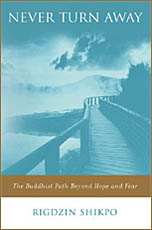"Our difficulties arise from the passionate longing to identify with ideas and notions about the world. Belonging and excluding go together, so as we enter into a mandala, we exclude whatever doesn't belong within it. This is well illustrated by the English writer who once defined a nation as a 'club for hating foreigners.'
"The commonest reason to develop hatred is the perceived difference between ourselves and others. We may feel so strongly about our notions of religion, race, class, language, or culture that we band together for the sole purpose of rejecting another group and its inimical differences. And we justify this by saying, 'They're an assault on our institutions!' or 'They don't behave as we do!'
"Hatred and paranoia don't exist in themselves. They must have a reason — even if that reason makes no sense — to create the ground for them to run and intensify. We can see people trying to make this happen, supporting each other and telling stories. These could be stories about religion — about Dharma, and gurus, and teachers. There is nothing wrong with any of this, as such; it is quite natural to create such mandalas of connections. But because ignorance is present, it very easily runs into areas where negative emotions build up.
"We can espouse and identify with the Buddha's teaching in just as narrow-minded a fashion — even though it runs contrary to the whole thrust of Dharma practice — as we do with anything else. Maybe we find ourselves thinking that other Buddhists aren't really proper practitioners because they don't follow this or that wonderful method. This is bound to happen, simply because we are human, so we need to watch out for it within ourselves as we travel the path.
"In Buddhism, no view we take of the universe is true for all time or set in stone. We practice to transcend the view we take of the universe at any given time. As another view becomes appropriate, we train in that view, until we have to abandon that as well.
"Finally, we reach the point where we are no longer projecting with a view. We gain some genuine insight that goes beyond reliance on any view as such. Until then, however, we need to see how our views about other people and the world provide the link between our emotions and actions.
